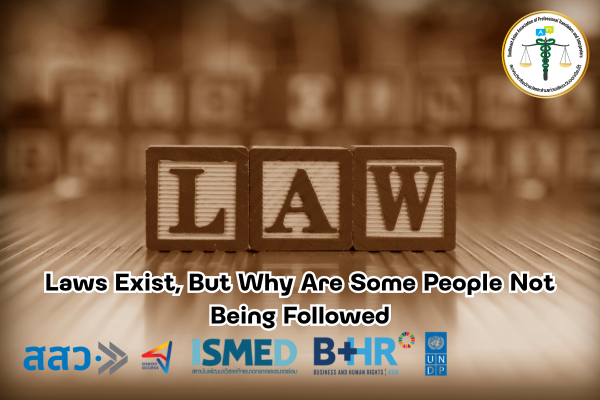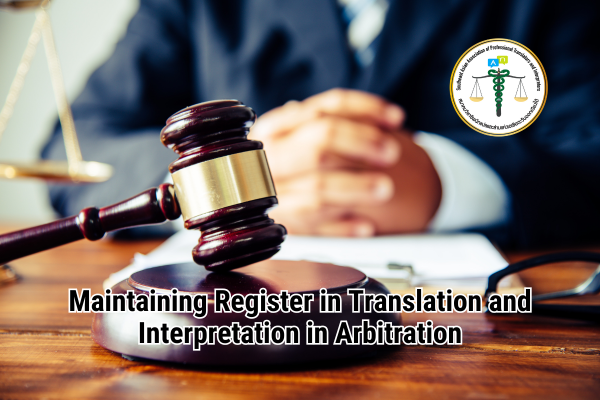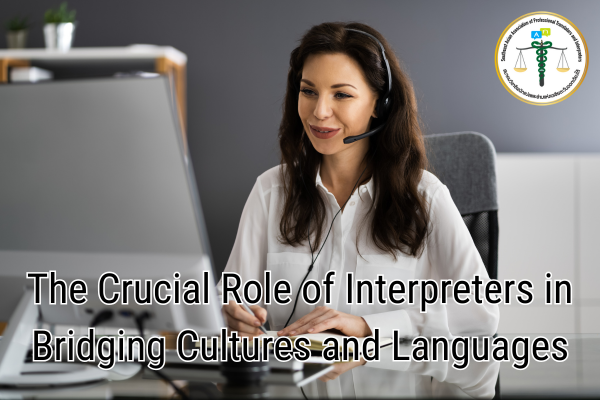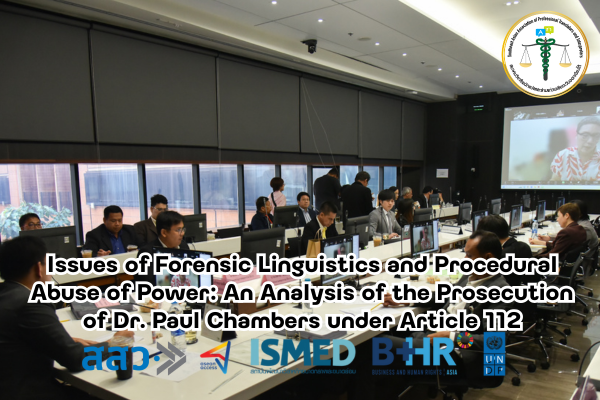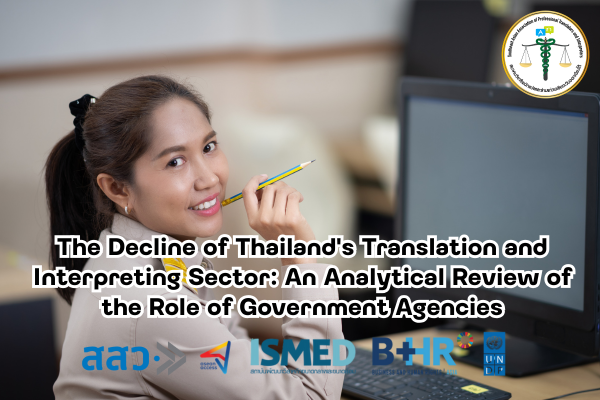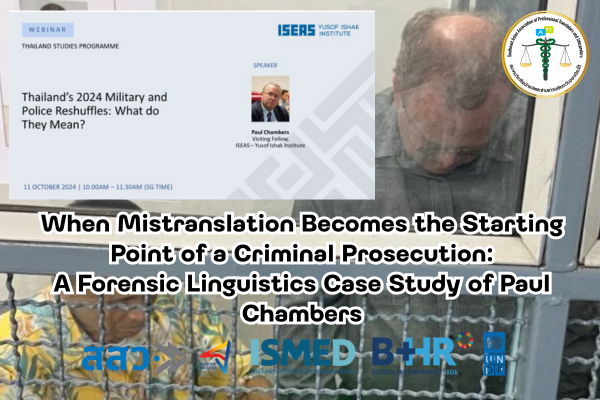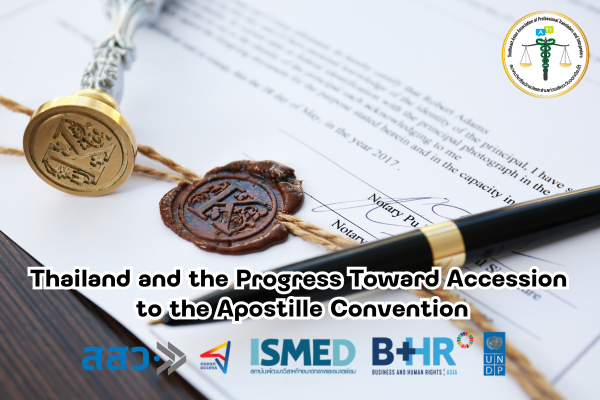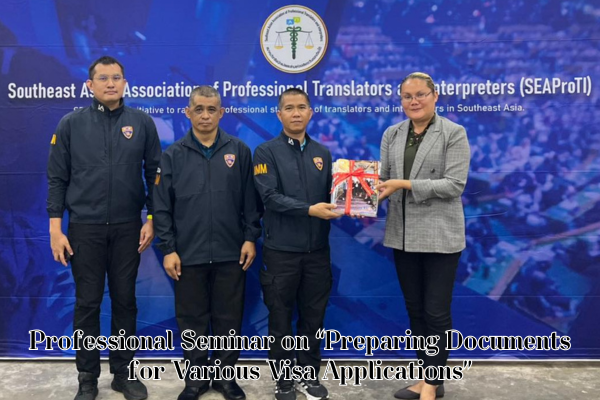Laws Exist, But Why Are Some of Them Not Being Followed
14 April 2025, Bangkok – A Review of Certified Translators, Translation Certification Providers, and the Effort to Elevate Professional Standards in Thailand By the Southeast Asian Association of Professional Translators and Interpreters (SEAProTI)
In today’s world—where the movement of people, information, and commerce across borders has become the norm—translators and interpreters are no longer merely linguistic intermediaries. They guarantee legal credibility, business integrity, and human rights in justice systems. However, despite Thailand having had legal frameworks related to translation and translation certification in place for more than 25 years, these provisions are often not widely observed in practice—especially among key players in the justice system, such as lawyers, government agencies, and immigration officials.
This raises a critical question: Why?
Legal Frameworks: Present, Yet Ineffectual
1. Administrative Procedure Act, B.E. 2539 (1996)
Although the Act outlines general conditions for translation certification, it does not clearly define who is legally authorized to certify a translation. Nor does it explicitly recognize the roles of translators or translation certifiers, resulting in interpretive gaps and discretionary enforcement.
2. Ministerial Regulation (1997 Amendment)
This regulation, issued under the authority of Sections 6 and 26 of the Administrative Procedure Act, outlines who may certify the accuracy of translations into Thai:
Section 1: Authorized Certifiers of Thai Translations
(1) Thai nationals who have completed at least a bachelor’s degree in a curriculum where the foreign language appearing in the document was the medium of instruction
(2) Lecturers at higher education institutions who teach the relevant language
(3) Foreign embassies or consulates in Thailand, if the language is an official language of that country
(4) Thai embassies or consulates abroad
Section 2: Circumstances Where a Thai Translation Is Not Required
(1) When the government official can personally understand the foreign language
(2) When the official has colleagues who are proficient in the language
3. Ministry of Foreign Affairs Regulation on Document Legalization, B.E. 2539 (1996)
This regulation permits members of the public to translate and submit documents for legalization without requiring a license. However, it prohibits misleading promotional claims in translated documents—such as stating “translated by an expert” without evidence.
SEAProTI: Establishing a National Certification Framework
On 25 July 2024, a declaration was published in the Royal Thai Government Gazette by the Secretariat of the Cabinet under the Prime Minister’s Office, officially recognizing the Southeast Asian Association of Professional Translators and Interpreters (SEAProTI) as the first organization in Thailand to establish:
- Certified Translators (CT)
- Translation Certification Providers (TCP)
- Certified Interpreters (CI)
This framework includes official rules of practice, qualification standards, and a professional code of ethics—aligned with international standards such as those observed by ATA, NAATI, AIIC, and member countries of the OECD.
Why Are Legal Guidelines Still Being Ignored?
Despite the existence of clear legal guidelines, many veteran translators, interpreters, and legal professionals continue to bypass the certified system. Key reasons include:
1. Economic Privilege and Legacy Power Structures
In the past, foreign language proficiency was a rare and privileged skill in Thai society. Those who possessed it—regardless of academic or professional qualifications—often secured prominent roles in government, diplomacy, and international affairs. This created an informal monopoly on language services, free from regulation or quality assurance.
With the introduction of structured professional standards and certification—often informed by global best practices—some individuals view the new system as a threat to their long-held socioeconomic advantages. The fear is that such mechanisms could displace them from their roles or erode their earning potential.
2. Entrenchment in an Unregulated System
Due to the absence of a clear, enforceable certification structure in the past, many translators have operated without licensing, examination, quality oversight, or ethical obligations. This led to a tolerance for inconsistency—even harmful inaccuracies—which could negatively impact the rights or legal standing of document users.
Moreover, this unregulated environment allowed some to exploit the system for unethical gain. Individuals operating under the belief that “winning a case by any means” is justifiable have misused translations to distort facts—undermining public trust and jeopardizing social order and the integrity of the justice system.
3. Resistance to New Oversight Mechanisms
Although SEAProTI is an independent, non-profit body committed to inclusivity, resistance persists—especially from those who once benefited from the unregulated system. These individuals often see the new framework as a “loss of status, profession, or income.”
However, SEAProTI does not aim to force abrupt change. Instead, it focuses on laying a sustainable foundation so that the next generation of language professionals can appreciate the value of global professional standards and grow to become practitioners whose competence matches their international peers.
Toward Systemic Reform: From Certification to Public Confidence
SEAProTI proposes the following policy recommendations and systemic reforms:
- Establish a publicly accessible database of certified translators and interpreters
- Encourage government agencies to officially recognize certification from professional bodies in their official registers
- Urge the private sector and immigration authorities to discontinue the use of uncertified individuals
- Provide training for legal practitioners and court officers on the role of certified translation
- Implement mechanisms for complaints and accountability where translation errors cause harm
Conclusion
Translation is no longer just a matter of language—it is a matter of legal accuracy, professional accountability, and ethical responsibility. In an era where transparency, human rights, and justice are global priorities, using certified translators and interpreters is not a luxury—it is a professional and moral imperative for Thailand’s legal system and international credibility.
SEAProTI’s certified translators, translation certification providers, and certified interpreters:
The Southeast Asian Association of Professional Translators and Interpreters (SEAProTI) has officially announced the criteria and qualifications for individuals to register as “Certified Translators,” “Translation Certification Providers,” and “Certified Interpreters” under the association’s regulations. These guidelines are detailed in Sections 9 and 10 of the Royal Thai Government Gazette, issued by the Secretariat of the Cabinet under the Office of the Prime Minister of the Kingdom of Thailand, dated July 25, 2024, Volume 141, Part 66 Ng, Page 100.
กฎหมายเกี่ยวกับนักแปลและล่ามมีอยู่ แต่เหตุใด หลายคนจึงไม่ปฏิบัติตาม
14 เมษายน 2568, กรุงเทพมหานคร – ทบทวนข้อเท็จจริงเกี่ยวกับนักแปลรับรอง ผู้รับรองการแปล และการยกระดับมาตรฐานวิชาชีพในประเทศไทย โดย สมาคมวิชาชีพนักแปลและล่ามแห่งเอเชียตะวันออกเฉียงใต้ (SEAProTI)
ในยุคที่การเคลื่อนย้ายไปมาของผู้คน ข้อมูล และธุรกิจข้ามพรมแดนกลายเป็นเรื่องปกติ “นักแปล” และ “ล่าม” ไม่ได้เป็นเพียงตัวกลางของภาษาอีกต่อไป แต่กลายเป็นผู้ค้ำจุนความน่าเชื่อถือในระบบกฎหมาย ความมั่นคงในธุรกิจ และสิทธิมนุษยชนในกระบวนการยุติธรรม อย่างไรก็ตาม แม้ประเทศไทยจะมีกรอบกฎหมายที่เกี่ยวข้องกับการแปลและการรับรองคำแปลมานานกว่า 25 ปี แต่ในทางปฏิบัติ กลับพบว่าแนวทางเหล่านั้นยังไม่ได้รับการยึดถืออย่างกว้างขวาง โดยเฉพาะจากผู้มีบทบาทสำคัญในกระบวนการยุติธรรม เช่น ทนายความ หน่วยงานรัฐ และผู้ประเมินเอกสารของชาวต่างชาติ
คำถามที่น่าคิดคือเพราะเหตุใด
กรอบกฎหมาย: มีอยู่จริง แต่ว่างเปล่า
1. พระราชบัญญัติวิธีปฏิบัติราชการทางปกครอง พ.ศ. 2539
ที่ออกตามพระราชบัญญัติวิธีปฏิบัติราชการทางปกครอง พ.ศ. 2539 ระบุเพียงหลักเกณฑ์การรับรองคำแปล แต่ไม่มีการกำหนดชัดเจนว่า “ใคร” เป็นผู้รับรองที่ได้รับอนุญาตตามกฎหมาย และไม่มีบทบัญญัติที่กล่าวถึงบทบาทของนักแปลหรือผู้รับรองการแปลอย่างตรงไปตรงมา ทำให้เกิดช่องว่างในการตีความและการใช้ดุลพินิจ
2. พระราชบัญญัติวิธีปฏิบัติราชการทางปกครอง พ.ศ. 2539 แก้ไข ในปี พ.ศ. 2540
มีบทบัญญัติว่าด้วย บุคคลที่สามารถรับรองคำแปลได้ แต่ไม่มีบทบัญญัติที่กล่าวถึงบทบาทของนักแปลหรือผู้รับรองการแปลอย่างตรงไปตรงมา ทำให้เกิดช่องว่างในการตีความและการใช้ดุลพินิจ
อาศัยอำนาจตามความในมาตรา ๖ และมาตรา ๒๖ วรรคสอง แห่งพระราชบัญญัติวิธีปฏิบัติราชการทางปกครอง พ.ศ. ๒๕๓๙ นายกรัฐมนตรีโดยคำเสนอแนะของคณะกรรมการวิธีปฏิบัติราชการทางปกครอง ออกกฎกระทรวงไว้ ดังต่อไปนี้
ข้อ ๑ การรับรองความถูกต้องของคำแปลเป็นภาษาไทย ให้กระทำโดย
(๑) คนไทยที่จบการศึกษาในระดับที่ไม่ต่ำกว่าปริญญาตรีในหลักสูตรที่ใช้ภาษาที่ปรากฏในเอกสารนั้นเป็นภาษาในการเรียนการสอน
(๒) อาจารย์ในสถาบันการศึกษาระดับอุดมศึกษาและเป็นผู้สอนภาษาที่ปรากฏในเอกสารนั้นในสถาบันการศึกษาดังกล่าว
(๓) สถานทูตหรือสถานกงสุลต่างประเทศที่ตั้งอยู่ในประเทศไทย โดยประเทศนั้นใช้ภาษาที่ปรากฏในเอกสารนั้นเป็นภาษาราชการ
(๔) สถานทูตหรือสถานกงสุลไทยในต่างประเทศ
ข้อ ๒ เจ้าหน้าที่ที่จะยอมรับเอกสารที่ทำขึ้นเป็นภาษาต่างประเทศโดยไม่ต้องให้จัดทำคำแปลเป็นภาษาไทยในกรณี ดังต่อไปนี้
(๑) เจ้าหน้าที่นั้นเห็นว่าสามารถเข้าใจภาษาดังกล่าวได้
(๒) เจ้าหน้าที่นั้นมีผู้ร่วมงานที่มีความรู้ภาษาดังกล่าว
3. ระเบียบกระทรวงการต่างประเทศ ว่าด้วยการรับรองเอกสาร พ.ศ. 2539
ระเบียบกระทรวงการต่างประเทศ ว่าด้วยการรับรองเอกสาร พ.ศ. 2539 เปิดโอกาสให้บุคคลทั่วไปสามารถแปลและยื่นรับรองได้ โดยไม่ต้องเป็นผู้มีใบอนุญาต และต่อมา มีข้อห้ามเรื่องการโฆษณาโอ้อวดในเอกสารแปล เช่น การใช้คำว่า “ผู้เชี่ยวชาญ” หากไม่มีหลักฐานรับรอง
SEAProTI กับการตั้งระบบ “ใบอนุญาตวิชาชีพ” อย่างเป็นทางการ
ประกาศในราชกิจจานุเบกษา ของสำนักเลขาธิการคณะรัฐมนตรี ในสำนักนายกรัฐมนตรี เมื่อวันที่ 25 กรกฎาคม 2567 ที่ผ่ามน สมาคมวิชาชีพนักแปลและล่ามแห่งเอเชียตะวันออกเฉียงใต้ (SEAProTI) ได้ก่อตั้งระบบ นักแปลรับรอง (Certified Translators), ผู้รับรองการแปล (Translation Certification Providers) และ ล่ามรับรอง (Certified Interpreters) ขึ้นเป็นแห่งแรกในประเทศไทย พร้อมออกข้อบังคับรับรองคุณสมบัติ จรรยาบรรณ และแนวทางการปฏิบัติงานที่เทียบเท่ามาตรฐานสากล เช่นเดียวกับในประเทศสมาชิก OECD หรือองค์กรวิชาชีพนานาชาติ เช่น ATA, NAATI, AIIC
เหตุผลที่ “ไม่ปฏิบัติตาม” แม้จะมีกฎหมาย
เราทราบกันดีว่า มีนักแปลและล่ามรุ่นเก่า ๆ หรือผู้ที่อยู่ในกระบวนการยุติธรรมรุ่นเก่า ๆ ที่คุ้นชินกับแนวทางการทำหน้าที่ของนักแปลและล่ามรุ่นเก่าไม่ปฏิบัติตามระบบกฎหมายใหม่ ถึงแม้จะมีกฎหมายที่ชัดเจนก็ตาม ด้วยเหตุผลดังต่อไปนี้
1. มิติทางเศรษฐกิจและอำนาจเก่า
ในอดีต คนที่พูดภาษาต่างประเทศได้ถือเป็น “คนพิเศษ” หรือได้ Previllage ในสังคมไทย โดยเฉพาะในยุคที่ความสามารถด้านภาษาต่างประเทศยังเป็นของหายาก บุคคลจำนวนหนึ่งจึงเข้ามายึดครองพื้นที่การแปลและล่ามในระดับราชการ การทูต หรือกิจการระหว่างประเทศ โดยไม่มีระบบควบคุมหรือประเมินคุณภาพ
เมื่อระบบวิชาชีพที่มีมาตรฐานเริ่มเกิดขึ้น มาพร้อมกับคนรุ่นใหม่ และแนวทางหรือมาตรฐานใหม่ ๆ จากต่างประเทศและเป็นสากล คนกลุ่มนี้อาจมองว่าสิทธิหรือโอกาสทางเศรษฐกิจที่เคยถือครองจะถูก “ช่วงชิง” ไปโดยกลไกที่พวกเขาไม่สามารถควบคุมได้
2. ความเคยชินกับระบบไร้มาตรฐาน
เนื่องจากกฎหมายเดิมยังไม่ได้กำหนดโครงสร้างการรับรองคำแปลอย่างชัดเจน ทำให้ผู้แปลจำนวนมากสามารถดำเนินงานได้โดยไม่ต้องผ่านการสอบ ไม่มีใบอนุญาตประกอบวิชาชีพ ไม่มีการตรวจสอบคุณภาพ และไม่อยู่ภายใต้จรรยาบรรณที่มีผลผูกพัน ส่งผลให้การแปลผิดพลาดโดยไม่ได้เจตนา หรือการแปลที่ขาดความรับผิดชอบ อาจก่อให้เกิดความเสียหายแก่ผู้ใช้เอกสารอย่างร้ายแรง
ยิ่งไปกว่านั้น การที่ระบบขาดมาตรฐานที่ชัดเจนมานาน ยังเปิดช่องให้บุคคลบางกลุ่มที่มีแนวคิดว่า “ทำอย่างไรก็ได้ให้ชนะคดี” เข้ามาใช้บริการแปลอย่างไม่ถูกต้อง เพื่อแสวงหาผลประโยชน์ในทางที่ผิด โดยมิได้คำนึงถึงศีลธรรมอันดีของประชาชน หรือความสงบเรียบร้อยของสังคม ซึ่งอาจนำไปสู่การบิดเบือนข้อเท็จจริงและบ่อนทำลายกระบวนการยุติธรรมในระยะยาว
3. การต่อต้านกลไกควบคุมใหม่
แม้ว่าระบบที่สมาคมวิชาชีพนักแปลและล่ามแห่งเอเชียตะวันออกเฉียงใต้ (SEAProTI) ได้จัดตั้งขึ้นจะมีลักษณะเป็นองค์กรอิสระ ไม่แสวงหากำไร และเปิดกว้างต่อการมีส่วนร่วมจากทุกภาคส่วน แต่ก็ยังพบแรงต่อต้านจากบุคคลบางกลุ่มที่เคยได้รับผลประโยชน์จากโครงสร้างเดิม ซึ่งมองว่าแนวปฏิบัติใหม่เป็นการ “ริดรอน” สถานะ อาชีพ และรายได้ที่ตนเคยถือครอง
อย่างไรก็ตาม สมาคมมิได้มุ่งหวังให้เกิดการเปลี่ยนแปลงอย่างฉับพลัน หากแต่ตั้งใจวางรากฐานเพื่อให้คนรุ่นใหม่ได้เห็นถึงคุณค่าของการยึดมั่นในมาตรฐานวิชาชีพระดับสากล และเติบโตขึ้นเป็นผู้ประกอบวิชาชีพนักแปลและล่ามที่มีความสามารถทัดเทียมกับผู้เชี่ยวชาญในเวทีโลกอย่างแท้จริง
ข้อเสนอเชิงระบบ: จากการรับรองสู่ความเชื่อมั่น
SEAProTI ขอนำเสนอแนวทางที่ควรผลักดันในระดับนโยบายและระดับสังคม ดังนี้:
- จัดให้มีฐานข้อมูลนักแปลและล่ามที่ได้รับใบอนุญาตอย่างเปิดเผย
- ผลักดันให้หน่วยงานรัฐบรรจุระบบการรับรองจากองค์กรวิชาชีพไว้ในสารบัญราชการ
- ให้ภาคเอกชนและหน่วยงานตรวจคนเข้าเมือง เลิกใช้บุคคลที่ไม่มีใบอนุญาต
- อบรมภาคส่วนกฎหมาย เช่น ทนายความและเจ้าหน้าที่ศาล ให้เข้าใจบทบาทของนักแปลรับรอง
- สร้างระบบร้องเรียนกรณีผู้ให้บริการแปลทำให้เกิดความเสียหาย
บทสรุป
“การแปลและการล่าม” ไม่ใช่เรื่องของภาษาอย่างเดียวอีกต่อไป แต่คือ ความถูกต้องตามกฎหมาย ความรับผิดชอบต่อสังคม และการยืนหยัดในจรรยาบรรณ ในบริบทที่โลกกำลังให้ความสำคัญกับความโปร่งใส สิทธิมนุษยชน และความยุติธรรม การใช้บริการจากนักแปลและล่ามที่ได้รับการรับรองตามมาตรฐานวิชาชีพจึงไม่ใช่ “ทางเลือก” แต่คือ “ข้อพึงปฏิบัติ” ที่จำเป็นต่ออนาคตของระบบกฎหมายไทยในเวทีโลก
เกี่ยวกับนักแปลรับรอง ผู้รับรองการแปล และล่ามรับรองของสมาคมวิชาชีพนักแปลและล่ามแห่งเอเชียตะวันออกเฉียงใต้
สมาคมวิชาชีพนักแปลและล่ามแห่งเอเชียตะวันออกเฉียงใต้ (SEAProTI) ได้ประกาศหลักเกณฑ์และคุณสมบัติผู้ที่ขึ้นทะเบียนเป็น “นักแปลรับรอง (Certified Translators) และผู้รับรองการแปล (Translation Certification Providers) และล่ามรับรอง (Certified Interpreters)” ของสมาคม หมวดที่ 9 และหมวดที่ 10 ในราชกิจจานุเบกษา ของสำนักเลขาธิการคณะรัฐมนตรี ในสำนักนายกรัฐมนตรี แห่งราชอาณาจักรไทย ลงวันที่ 25 ก.ค. 2567 เล่มที่ 141 ตอนที่ 66 ง หน้า 100 อ่านฉบับเต็มได้ที่: นักแปลรับรอง ผู้รับรองการแปล และล่ามรับรอง


